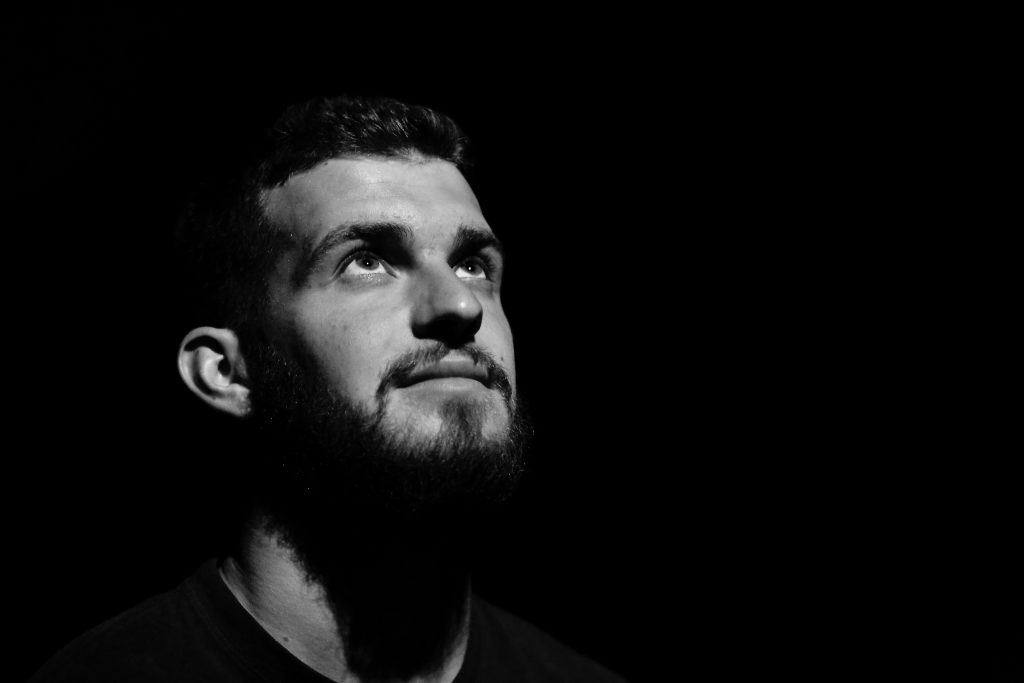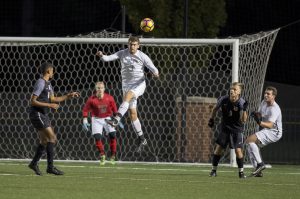
My name is Steve Binnig. I am a senior from Pittsburgh, Pennsylvania and am a member of the Men’s Soccer team at Hope College. Here is a piece of my story.
On Tuesday January 8th, 2018, the second day of classes of my second semester of junior year, I woke up in a panic attack.
Up until that moment, I had never experienced a panic attack before. Frankly, I had never really had anxiety before. For the first time in my life, I did not think I was going to be able to bring myself to get out of bed. For the rest of the semester, everyday tasks like going to class, grabbing lunch with my closest buddies, and hitting the weight room suddenly felt impossible to accomplish. My brain felt like it was running at a million miles an hour. I could not make sense of my thoughts, feelings, or emotions. Again, this entire experience was new to me, and for all intents in purposes, made no sense.
Let me back track a bit. I come from a great family. I have a set of parents who love God, love each other, and love my sisters and me more than anything in the world. I have a lot of friends. I have an awesome girlfriend. I do well in school. I have a bright future… so why in the world did I have any reason to panic?
While I don’t know exactly what the root of this initial panic and anxiety was, what I can tell you is that the days since January 8th of this year have been hard. Some days have been downright terrible. I have had to do some things that were, at first, really uncomfortable. It started with a conversation that same Tuesday between me and two of my closest friends, Hayden Smith and Tucker Marty. I told them what I was experiencing, and that I had no idea how to stop it. Hayden and Tucker are two understanding and compassionate people, but it is still incredibly difficult to open yourself up like that to others. Luckily, they encouraged me to reach out to my family, my girlfriend Holly, and a few others I consider my closest friends. To set the record straight, I have never had a hard time articulating my thoughts and feelings. I am a verbal processor, and I enjoy working through the thoughts in my head with others. But, attempting to make sense of my brain on that Tuesday felt undoable. That being said, I could not be happier that Hayden and Tucker encouraged me to speak up.
Consequently, for most of this calendar year, I have been going to regular therapy sessions and been prescribed different medications to treat General Anxiety Disorder and Panic Disorder. I have seen my support system rally around me in ways that I did not think were possible. Bottom line, I got, and am continuing to receive, the help that I need.
Now, enough about me. What does this mean for you? Allow me to clear the air: this is not a pity party. I am not asking for your sympathy. Save it. What I am asking is for you to consider your current and past perspectives on mental health.
Prior to this happening in my own life, when trying to understand someone dealing with mental illness, I would think things like, “Why can’t you just turn it off?”, or “Just get over it already.” Maybe I am just a cold-hearted individual, but my intuition tells me that a friend, family-member, or complete stranger has led you to think these things at least one time or another. Maybe, it’s been thoughts about yourself in your own head that have led you to feel this way.

As an athlete, I get it. For as long as I can remember, I have had coaches, teammates, parents, mentors, etc. teaching me what it means to be, “tough.” Tough, in this case, means that to show even a glimpse of weakness would make one a failure. Athletes are conditioned to be tough. From the way we train, to the way we play, even in the way that we relate to others… the best athletes are the toughest ones.
Fear not, I am not about to dismantle the idea of athletics. I have learned many of my most valuable life lessons on the soccer field. I believe that through sport, we gain invaluable skills that carry over into our day-to-day lives. But do not miss this.
I also believe that in our culture, specifically in the sports world, we have created an environment where athletes are discouraged to speak up about their internal battles. That needs to change.
If I have learned anything from battling mental illness it is this: Tough does not internalize. Instead, tough works through the messiest parts of life and faces its hardest trials head on. Tough asks for help when help is required. And most importantly, tough never, even when it seems absolutely impossible to keep moving forward, gives up.
All things considered, we attend a school that offers both a safe and welcoming campus. Speaking from my own experience, staff and faculty at Hope actually want to know their students. They care about us, and that is not the case at a lot of institutions. However, I understand that fact does not necessarily make it any easier to seek out the help you need. If I’m honest, one of my biggest fears in this whole thing was that my family, friends, and mentors would consider me a “bad Christian” because I was dealing with anxiety, panic and depression. In my head, I was convinced that no “good Christian” would struggle the way that I was struggling. Hear these words that I have had to tell myself repeatedly over the last several months: that is a lie straight from the pit of hell. There is no such thing as a perfect person, let alone Christian. We live in an imperfect world, full of sin, sickness, hardship, poverty… the list goes on. We, as people are inherently fallen and sinful. As a result, things like anxiety and depression exist. My point is that one of the first steps in confronting mental illness is recognizing that struggling with anxious thoughts, panic, depression, thoughts of suicide, self-harm or whatever is not abnormal. It is simply another negative byproduct of our fallen world. As Kevin Love recently stated in his article by the same name, “everyone is dealing with something.” Remember, no man is an Island.
My goal is to get people talking. Friends talking with friends, students with professors, departments with other departments, athletes with non-athletes, Sibs with Delphis, baseball players with football players, community members with Hope students. You get the point.
The people of Hope are too valuable to struggle on their own. We are blessed with too strong of a community to allow one another to fight our demons independently.
No, I don’t have the answer. But, I do know there needs to be change. If nothing else, I am here to tell you that mental illness is very real. I am ashamed to say that I would not have said that a few months ago. It is no secret that there is a negative stigma that surrounds mental health in our country, and I have been guilty of contributing to that stigma in the past. The important piece moving forward is that we can debunk the idea that the person inflicted with mental illness is weak, incapable, crazy and/or a failure.
Speak up. Whether for yourself or for someone you love. Speak up. I can’t promise it will be easy, but I can promise it will be good.
THE HOPE ATHLETES’ JOURNAL MISSION STATEMENT
The mission of the Hope Athletes’ Journal is to provide Hope College student-athletes with a platform to express their challenges and joys in order for coaches, peers, prospective students, and fans to relate to, understand, and appreciate their stories beyond their games. This project, initiated by Stephen Binning ’19, encourages and invites Hope student-athletes to write vulnerable, principled, honest, and respectful stories that ultimately knit our college even closer together.
If you or someone you know has a story that could be shared on the Hope Athletes’ Journal, please reach out to Lindsey Engelsman (engelsman@hope.edu) or Eva Dean Folkert (folkert@hope.edu).
If you or someone you know is in need of help, here are some resources both on and off campus:
Hope College Office of Counseling and Psychological Services (CAPS): 616-395-7945
Hope College Campus Ministries: 616-395-7145
National Suicide Prevention Lifeline: 1-800-273-8255
National Sexual Assault Hotline: 1-800-656-4673

